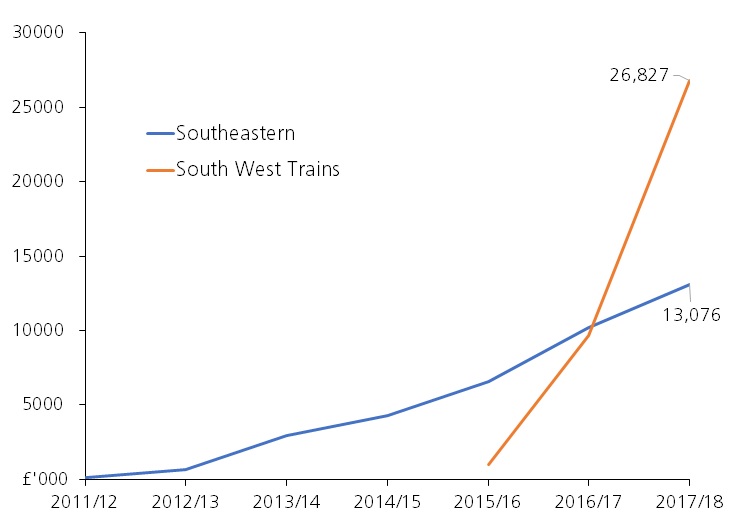HouseOfCommons
Verified Rep - House of Commons
We thought you might be interested in a recent Insight from the House of Commons Library on the Delay Repay compensation scheme.
Under the scheme, a passenger is entitled to 50% of the cost of a single fare if a train is delayed by more than 30 minutes, irrespective of the cause of the delay.
According to the Library's research, many rail passengers, namely season ticket holders, have been left several hundred pounds worse off under the Delay Repay passenger compensation regime, while some train operators might also be financially better off than they were under the old Passenger’s Charter regime.
This graph shows the compensation paid out by South West Trains (under the Passenger’s Charter until August 2017) compared to Southeastern (under Delay Repay since July 2011) in the years leading up to 2017/18. It compares the total amount of compensation paid out up to 2017/18 for South West Trains and Southeastern, based on the latest compensation data published by the Department for Transport.

The Insight explains the difference between Delay Repay and its predecessor, the Passenger’s Charter scheme, and looks at how much compensation passengers get depending on the type of ticket they own.
For further reading, have a look at the Rail passenger rights, compensation and complaints Library Briefing published last month.
Under the scheme, a passenger is entitled to 50% of the cost of a single fare if a train is delayed by more than 30 minutes, irrespective of the cause of the delay.
According to the Library's research, many rail passengers, namely season ticket holders, have been left several hundred pounds worse off under the Delay Repay passenger compensation regime, while some train operators might also be financially better off than they were under the old Passenger’s Charter regime.
This graph shows the compensation paid out by South West Trains (under the Passenger’s Charter until August 2017) compared to Southeastern (under Delay Repay since July 2011) in the years leading up to 2017/18. It compares the total amount of compensation paid out up to 2017/18 for South West Trains and Southeastern, based on the latest compensation data published by the Department for Transport.

The Insight explains the difference between Delay Repay and its predecessor, the Passenger’s Charter scheme, and looks at how much compensation passengers get depending on the type of ticket they own.
For further reading, have a look at the Rail passenger rights, compensation and complaints Library Briefing published last month.

